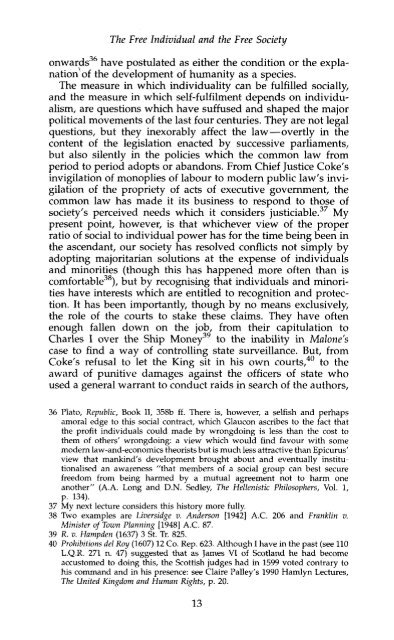LECTURES - College of Social Sciences and International Studies ...
LECTURES - College of Social Sciences and International Studies ...
LECTURES - College of Social Sciences and International Studies ...
Create successful ePaper yourself
Turn your PDF publications into a flip-book with our unique Google optimized e-Paper software.
The Free Individual <strong>and</strong> the Free Society<br />
onwards 36 have postulated as either the condition or the explanation'<strong>of</strong><br />
the development <strong>of</strong> humanity as a species.<br />
The measure in which individuality can be fulfilled socially,<br />
<strong>and</strong> the measure in which self-fulfilment depends on individualism,<br />
are questions which have suffused <strong>and</strong> shaped the major<br />
political movements <strong>of</strong> the last four centuries. They are not legal<br />
questions, but they inexorably affect the law—overtly in the<br />
content <strong>of</strong> the legislation enacted by successive parliaments,<br />
but also silently in the policies which the common law from<br />
period to period adopts or ab<strong>and</strong>ons. From Chief Justice Coke's<br />
invigilation <strong>of</strong> monoplies <strong>of</strong> labour to modern public law's invigilation<br />
<strong>of</strong> the propriety <strong>of</strong> acts <strong>of</strong> executive government, the<br />
common law has made it its business to respond to those <strong>of</strong><br />
society's perceived needs which it considers justiciable. 37 My<br />
present point, however, is that whichever view <strong>of</strong> the proper<br />
ratio <strong>of</strong> social to individual power has for the time being been in<br />
the ascendant, our society has resolved conflicts not simply by<br />
adopting majoritarian solutions at the expense <strong>of</strong> individuals<br />
<strong>and</strong> minorities (though this has happened more <strong>of</strong>ten than is<br />
comfortable 38 ), but by recognising that individuals <strong>and</strong> minorities<br />
have interests which are entitled to recognition <strong>and</strong> protection.<br />
It has been importantly, though by no means exclusively,<br />
the role <strong>of</strong> the courts to stake these claims. They have <strong>of</strong>ten<br />
enough fallen down on the job, from their capitulation to<br />
Charles I over the Ship Money 39 to the inability in Malone's<br />
case to find a way <strong>of</strong> controlling state surveillance. But, from<br />
Coke's refusal to let the King sit in his own courts, 40 to the<br />
award <strong>of</strong> punitive damages against the <strong>of</strong>ficers <strong>of</strong> state who<br />
used a general warrant to conduct raids in search <strong>of</strong> the authors,<br />
36 Plato, Republic, Book II, 358b ft. There is, however, a selfish <strong>and</strong> perhaps<br />
amoral edge to this social contract, which Glaucon ascribes to the fact that<br />
the pr<strong>of</strong>it individuals could made by wrongdoing is less than the cost to<br />
them <strong>of</strong> others' wrongdoing: a view which would find favour with some<br />
modern law-<strong>and</strong>-economics theorists but is much less attractive than Epicurus'<br />
view that mankind's development brought about <strong>and</strong> eventually institutionalised<br />
an awareness "that members <strong>of</strong> a social group can best secure<br />
freedom from being harmed by a mutual agreement not to harm one<br />
another" (A.A. Long <strong>and</strong> D.N. Sedley, The Hellenistic Philosophers, Vol. 1,<br />
p. 134).<br />
37 My next lecture considers this history more fully.<br />
38 Two examples are Liversidge v. Anderson [1942] A.C. 206 <strong>and</strong> Franklin v.<br />
Minister <strong>of</strong> Town Planning [1948] A.C. 87.<br />
39 R. v. Hampden (1637) 3 St. Tr. 825.<br />
40 Prohibitions del Roy (1607) 12 Co. Rep. 623. Although I have in the past (see 110<br />
L.Q.R. 271 n. 47) suggested that as James VI <strong>of</strong> Scotl<strong>and</strong> he had become<br />
accustomed to doing this, the Scottish judges had in 1599 voted contrary to<br />
his comm<strong>and</strong> <strong>and</strong> in his presence: see Claire Palley's 1990 Hamlyn Lectures,<br />
The United Kingdom <strong>and</strong> Human Rights, p. 20.<br />
13

















